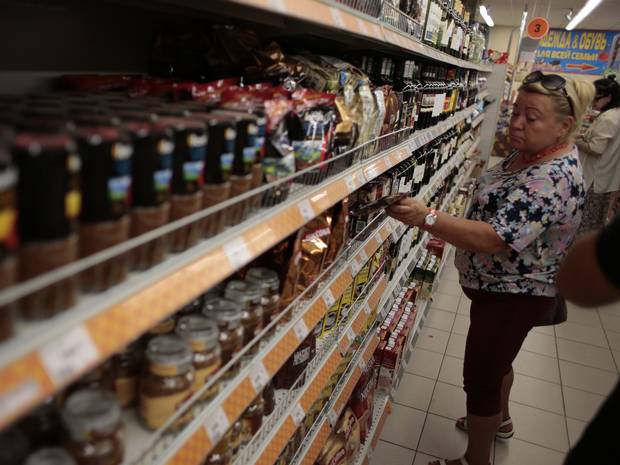Russia has imposed a “full embargo” on food imports from the EU, US and some other Western countries, in response to sanctions over Ukraine.
PM Dmitry Medvedev said it would include fruit, vegetables, meat, fish, milk and dairy imports.
Australia, Canada and Norway are also affected.
Russia is also banning Ukrainian airlines from transit across its territory, he said in televised comments to the government.
Furthermore, the Russian government is considering banning transit flights for EU and US airlines in retaliation for sanctions over Ukraine, he said.
Barring airlines from Siberian airspace would significantly increase costs and flying time for many jets bound for Asian destinations.
EU food exports to Russia last year were worth 11.8 billion euros ($15.8 billion) while US food exports to Russia were worth 972 million euros ($1.3 billion).

Russia was the EU’s second-biggest market for food exports (10% of total), after the US (13%).
The European Commission said the Russian embargo was “clearly politically motivated”. It is considering how to respond.
Western governments accuse the Kremlin of fomenting the unrest in eastern Ukraine by supplying weapons and expertise to the pro-Russian separatists.
Last month the EU and the US tightened sanctions on Russia, with Brussels applying restrictions to key sectors of the economy as well as individuals. The first round of sanctions came after Russia annexed Ukraine’s Crimea region in March.
The crash of Malaysia Airlines Flight MH17 last month, killing 298 people, exacerbated tensions between the West and Russia, as the separatists in eastern Ukraine were widely blamed. It is strongly suspected that a Russian missile system was used to down the jet.
Dmitry Medvedev ordered the agriculture ministry and producer organizations to find ways to boost Russian farm output in order to prevent price rises for consumers.
Western exports of baby food to Russia are not on the sanctions list. Western pet food is not banned either, and Russians are not barred from buying Western food abroad, within customs limits.
The Russian authorities say they are confident the supermarket shelves will not be left empty – they are searching for alternative suppliers in South America, Turkey and China.
It is estimated that in big cities, like Moscow, more than 60% of food in the shops is imported.
Researchers at Capital Economics say “far and away the most vulnerable to the Russian sanctions is Lithuania, where exports of the banned products to Russia are equivalent to 2.5% of GDP”.
The major food exporters to Russia last year were, in order of importance: Belarus ($2.7 billion), Brazil ($2.4 billion), Ukraine ($1.9 billion), Germany ($1.8 billion) and Turkey ($1.68 billion), Reuters news agency reports.
In 2013 the biggest food sector in EU exports to Russia was cheese and curd, followed by pork, then alcoholic drinks, then apples, pears and quinces.
At the end of July Russia banned all fruit and vegetable imports from Poland, which has been among the most vocal critics of Russia’s involvement in Ukraine.
In January Russia also imposed a ban on imports of pigs and pork from the EU. The European Commission says that move was “disproportionate”, closing a market worth 25% of total EU pig and pork exports.
[youtube 4ZZCc3j4bZc 650]
